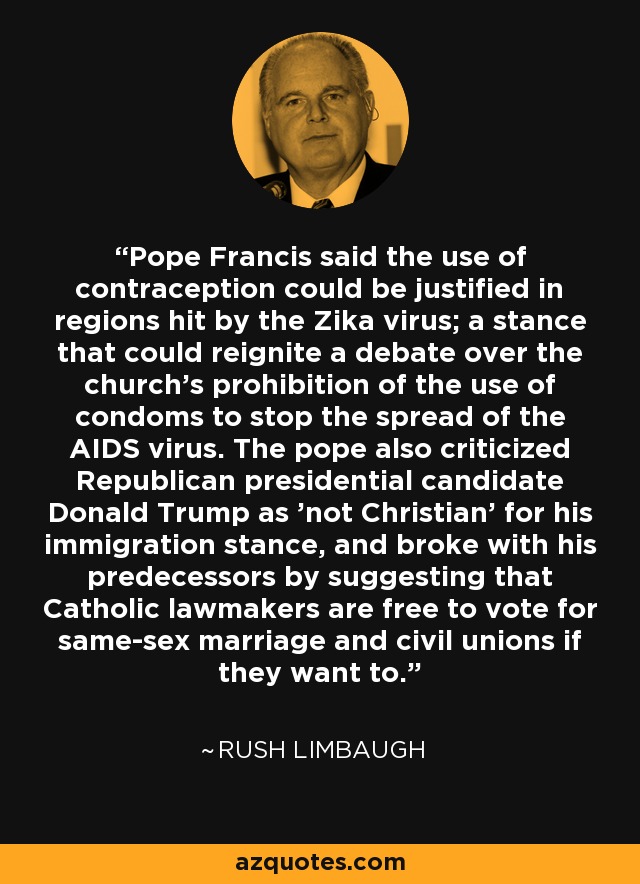Pope Francis, the 266th pope of the Catholic Church, has been a figure of both intrigue and inspiration since his election in 2013. Known for his humility and progressive stances on various social issues, Pope Francis has not shied away from addressing contemporary challenges faced by the Church and its followers. His approach often emphasizes mercy, compassion, and understanding, which has led to discussions about potential shifts in certain traditional teachings.
One such topic that has sparked considerable debate is the Church's stance on contraception. While the Catholic Church traditionally opposes artificial birth control methods, Pope Francis has introduced nuanced perspectives that reflect a more pastoral approach. This has prompted a re-examination of how family planning is understood within the context of modern realities and global health concerns. The implications of these discussions extend beyond religious doctrine, influencing societal norms and public policy worldwide.
Pope Francis' views on contraception have drawn attention due to their potential to reshape long-standing Church teachings. In exploring this nuanced stance, it becomes evident that while he upholds the core principles outlined in documents like Humanae Vitae, he also acknowledges the complexities of individual circumstances. This section delves into how Pope Francis addresses the issue of contraception, emphasizing the importance of responsible parenthood and ethical considerations.
The Evolution of Catholic Doctrine on Family Planning
The Catechism of the Catholic Church maintains that legitimate intentions on the part of the spouses do not justify recourse to morally unacceptable means. This principle underscores the Church's longstanding opposition to artificial contraception. However, during Pope Francis' return flight from Canada, a journalist inquired about the possibility of evolving the Church's teaching on this matter. Pope Francis reiterated the importance of adhering to doctrinal consistency but highlighted the need for compassionate interpretation in specific situations.
In discussing the potential for doctrinal development, Pope Francis emphasized that dogmas can be clarified or adapted to address contemporary issues without altering their fundamental essence. This perspective aligns with his broader vision of a Church that listens to its members and responds to their needs with empathy and wisdom. By acknowledging the complexity of modern family life, Pope Francis invites Catholics to engage in thoughtful reflection about their reproductive choices.
This openness to dialogue does not imply a departure from established teachings but rather an invitation to explore how these teachings can be applied more effectively in today's world. Through this approach, Pope Francis seeks to balance adherence to tradition with sensitivity to the diverse challenges faced by families today.
A Pastoral Approach to Reproductive Health
In the papal encyclical Humanae Vitae, Pope Paul VI firmly established the Church's position against artificial contraception. This document remains a cornerstone of Catholic teaching on human sexuality and procreation. However, Pope Francis has introduced a more pastoral dimension to these discussions, recognizing that rigid application of rules may not always serve the best interests of individuals and families.
During his trip to Mexico, Pope Francis addressed the Zika virus outbreak, suggesting that contraception could be considered the lesser of two evils in cases where there is concern about children being born with birth defects. This statement reflects his willingness to consider contextual factors when applying moral principles. By doing so, he underscores the importance of prioritizing human well-being over strict adherence to doctrinal absolutes.
While reaffirming the Church's commitment to natural family planning methods, Pope Francis acknowledges that exceptional circumstances may warrant different approaches. His emphasis on discernment and prudence encourages Catholics to make informed decisions based on their unique situations, guided by both faith and reason. This pastoral flexibility aims to support families in navigating the complexities of reproductive health responsibly.
Redefining Responsible Parenthood
Pope Francis has consistently advocated for responsible parenthood, urging couples to thoughtfully consider the timing and number of their children. He cautions against excessive focus on reproduction at the expense of other important aspects of family life. In remarks made during his return journey from Asia, Pope Francis humorously advised against breeding like rabbits, emphasizing the importance of self-control and deliberate planning.
By highlighting the value of temperance in family planning, Pope Francis reinforces the Church's teachings on the sanctity of life while acknowledging the practical realities of modern living. His approach invites Catholics to view parenthood as a sacred responsibility that requires careful consideration and mutual respect between partners. This perspective aligns with the Church's broader mission to promote holistic human development.
Ultimately, Pope Francis' stance on contraception reflects a balanced approach that respects doctrinal integrity while remaining responsive to the needs of contemporary society. Through his leadership, he encourages Catholics to engage in meaningful conversations about family planning, fostering an environment where faith and reason coexist harmoniously to guide ethical decision-making.

